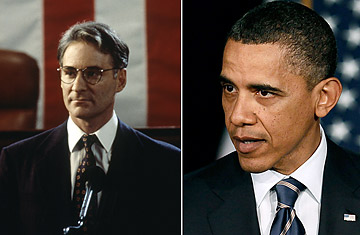
Kevin Kline in the 1993 film Dave, left, and President Obama, who spoke about fiscal policy at George Washington University on April 13, 2011
(2 of 2)
That's not really what Obama is all about. His speech at George Washington University made a smart and nuanced case for fiscal restraint, but he seemed energized only when he talked about increasing funding for education, research, infrastructure and other investments in "winning the future" and when he vowed to fight Republican proposals to slash safety-net spending for the poor and the elderly. He believes in government. He can't credibly pretend to be as enthused as his opponents are about shrinking it. He's got much more in common with Dave, who wanted to cut his budget only to save a homeless program.
Obama was at his strongest on Wednesday when he reminded his audience of how the Republicans got us into this mess in the first place. President Clinton left office with a huge budget surplus; President Bush and his allies in Congress converted it into massive deficits through enormous tax cuts, two unpaid-for wars and an unpaid-for prescription-drug benefit program for seniors. Then the economy imploded, which meant lower tax revenues, greater safety-net demands and an unprecedented deficit. Obama correctly pointed out that he inherited a nightmare. When he took office, the economy was hemorrhaging nearly 800,000 jobs per month; his stimulus bill swelled the deficit again, but it achieved its goal of helping stop the bleeding. His subsequent health care plan was fully paid for and then some.
So now what? The most important theme of Obama's speech was balance. While Ryan is proposing to balance the budget by slashing non-defense spending and ending Medicare and Medicaid as we know it — at the same time he's proposing even more tax cuts for the wealthy — Obama is suggesting additional taxes on top earners, along with discretionary spending cuts that wouldn't spare the Pentagon. He wants to squeeze Medicaid and Medicare too, but by strengthening the technocratic cost reforms in the Affordable Care Act, especially with an independent advisory board that could rein in excessive medical expenditures. During the Obamacare debate, Republicans derided the board as rationing and attacked the President for cutting Medicare, but now they seem to be supporting Ryan's harsher plan to replace Medicare with vouchers.
Obama is positioning himself as the adult in the room, the reasonable centrist caught between left wingers who don't want to cut anything but defense and right wingers who want to cut everything but defense. That might be good politics for his re-election campaign. It's already clear that Republicans will attack anything he proposes as radical socialism, just as they attacked his version of Mitt Romney's health care law and his version of John McCain's cap-and-trade plan. So by accepting some of what they want in advance, he can fight a battle of public opinion over their more extreme demands. He seemed to draw a line in the sand on Wednesday over Bush's tax cuts for high earners and Ryan's Medicare voucher plan; those are fights he'll be happy to rehash in 2012.
But while these pre-emptive concessions might be a good political strategy for 2012, they're a questionable negotiating strategy for 2011. Obama has done this throughout his presidency, ever since he embraced Republican demands for tax cuts in the stimulus without securing any promises of Republican votes. Including GOP priorities like oil drilling and nuclear reactors in his energy bill might have made him look magnanimous, but wouldn't it have made more sense to dangle them as carrots to secure the GOP's buy-in?
In previous negotiations, Republicans made it clear that the only way to secure their buy-in was to accept their priorities. Before last December's tax-cut deal, Republicans vowed to let unemployment benefits expire and middle-class taxes increase if they didn't get tax cuts for the rich; Obama correctly identified them as hostage takers but acceded to their demands. Before last week's budget deal, Republicans vowed to let the government shut down if they didn't get even more spending cuts than their leaders had originally proposed; again, Obama gave in and saved the hostage. It's not yet clear what kind of cuts they'll demand in exchange for raising the debt limit and avoiding a catastrophic national default this spring, but Obama already seems willing to meet them halfway; he is reportedly no longer insisting on a "clean bill" to raise the debt limit, essentially inviting Republicans to start writing their ransom letters.
Obama probably assumes that the public will be more sympathetic to his centrist vision than to Ryan's extreme one. That's not an unreasonable assumption. But once the debt-limit talks begin and the Republicans hold the government hostage yet again, Obama will find himself at a severe negotiating disadvantage.
After all, he cares about whether the hostage survives.
